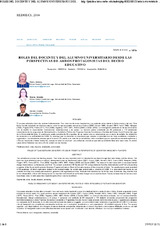Mostrar el registro sencillo del ítem
Roles del docente y del alumno universitario desde las perspectivas de ambos protagonistas del hecho educativo
| dc.contributor.author | Prieto Fernández, Marlene | |
| dc.contributor.author | Mijares, Brizeida | |
| dc.contributor.author | Llorent García, Vicente J. | |
| dc.date.accessioned | 2017-07-27T09:13:50Z | |
| dc.date.available | 2017-07-27T09:13:50Z | |
| dc.date.issued | 2014 | |
| dc.identifier.uri | http://hdl.handle.net/10396/14970 | |
| dc.description.abstract | El proceso educativo tiene dos actores fundamentales. Sus roles son de suma importancia y se pretende verlos desde la óptica propia y del otro. Este tópico ha sido estudiado por diversos autores, entre los que se pueden mencionar a Cabero (2007), Delors (1996), Escotet (1991), Kamii (1982), Màrques (1999), Piaget (1975), Rama (2011), Rué (2009), Vygotsky (1979; 1987), Walker (2006) y Zárate (2002). La investigación planteada es de tipo descriptiva, con un diseño no experimental, transeccional, contemporáneo y de campo. La muestra estuvo constituida por 68 profesores y 170 estudiantes universitarios de los programas de Administración y Contaduría Pública del Programa Ciencias Económicas y Sociales del Núcleo Costa Oriental del Lago de la Universidad del Zulia. El cuestionario usado constaba de 53 preguntas, de las cuales ocho se relacionaban con el objeto de estudio. Su validez fue de contenido y su confiablidad de 0.936. Se concluye que los docentes no consideran que cumplen a cabalidad con los roles académico, orientador y organizativo. Los estudiantes piensan que sí lo hacen. En cuanto a los roles de los estudiantes, ellos consideran que ser aprendiz permanente autónomo y crítico es importante y deben realizarlos, aunque no todos los practican. Los profesores consideran que todo aprendiente debe tener esos roles. En ambos casos deben fortalecer sus roles a fin de cumplir con los mismos | es_ES |
| dc.description.abstract | The educational process has two key players. Their roles are very important and it is intended to see them through their own lenses and the others. This topic has been studied by several authors, among which may be mentioned Cabero (2007), Delors (1996), Escotet (1991), Kamii (1982), Marquès (1999), Piaget (1975), Rama (2011) , Rue (2009), Vygotsky (1979, 1987), Walker (2006) and Zarate (2002). The research is descriptive with a non-experimental design, transectional, contemporary and field. The sample consisted of 68 faculty and 170 college students from the Administration and Public Accounting programs of the Social and Economic Sciences Program at Eastern Shore of the Lake campus of the University of Zulia. The questionnaire used consisted of 53 questions, of which eight were related to the subject matter. Its validity was content with a reliability of 0.936. It is concluded that faculty do not consider that they fully comply with academic, guidance and organizational roles. Students think that they do. As for the roles of students, they consider that to be independent, critical and lifelong learner is important and should be performed, though not all practice them. Faculty believes that all learners must have these roles. In both cases they must strengthen their roles to meet them. | es_ES |
| dc.format.mimetype | application/pdf | es_ES |
| dc.language.iso | spa | es_ES |
| dc.publisher | Universidad Rafael Belloso Chacín | es_ES |
| dc.rights | https://creativecommons.org/licenses/by-nc-nd/4.0/ | es_ES |
| dc.source | REDHECS. Revista electrónica de Humanidades, Educación y Comunicación Social 9 (2014) | es_ES |
| dc.subject | Roles | es_ES |
| dc.subject | Docente | es_ES |
| dc.subject | Estudiantes universitarios | es_ES |
| dc.subject | Faculty | es_ES |
| dc.subject | Student | es_ES |
| dc.subject | University | es_ES |
| dc.title | Roles del docente y del alumno universitario desde las perspectivas de ambos protagonistas del hecho educativo | es_ES |
| dc.type | info:eu-repo/semantics/article | es_ES |
| dc.relation.publisherversion | http://publicaciones.urbe.edu/index.php/REDHECS/article/viewArticle/3669/4701 | es_ES |
| dc.rights.accessRights | info:eu-repo/semantics/openAccess | es_ES |

